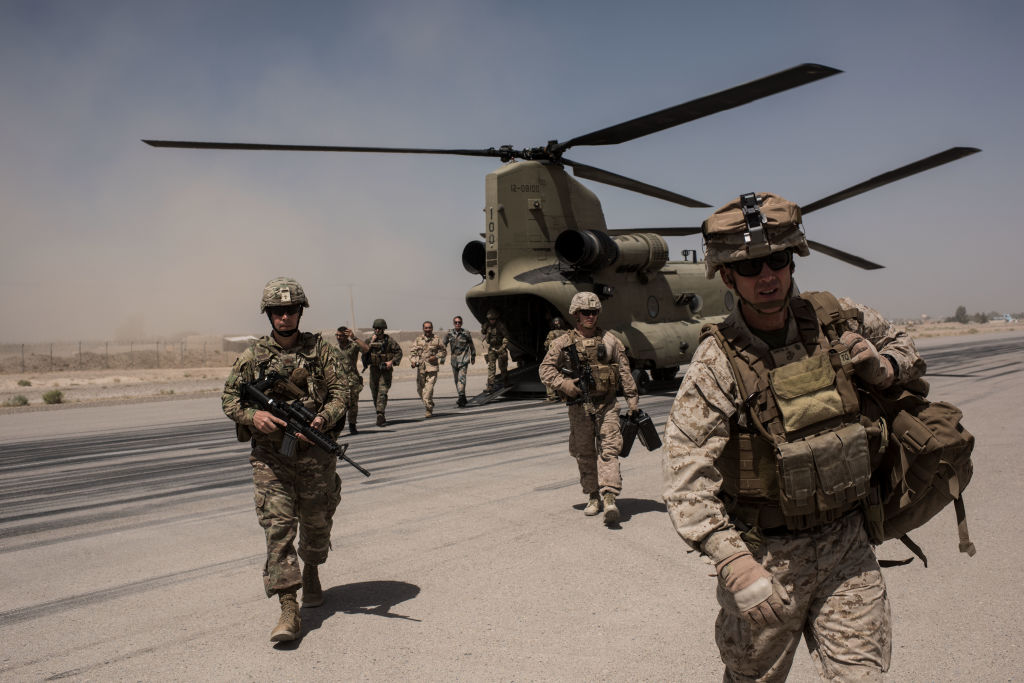The fall of Kabul, like the fall of Saigon, will be taught in classrooms for decades to come. But the dramatic images coming out of Afghanistan don’t necessarily hail the beginning of a post-American world. If America learns the right lessons, it has the chance to pursue a more sustainable foreign policy. One lesson it could learn is to stop outsourcing its war-making and foreign policy to overpaid private firms. In a less politically correct era, these groups would be called what they really are: mercenaries.
The corruption and graft expended on contracts of dubious value is legendary. In one episode, some £20 million was spent on forest camouflage for the now-collapsed Afghan National Army. The camouflage would have worked brilliantly, except there was almost no use for it. There isn’t much forest in Afghanistan – as little as 2 per cent of the country is covered by the green forests where this kind of camouflage would be useful. Instead, the uniform was based solely on the sartorial preferences of a single Afghan official.
The shares of war profiteers and weapons manufacturers all increased during the conflict
Every American taxpayer contributed to this debacle, which sadly was not an isolated instance. A 2018 report from the Special Inspector General for Afghanistan Reconstruction, or SIGAR, found that some £11 billion had disappeared through waste, fraud, and abuse of government funds related to the war. Much of that money ended up in the pockets of private contractors, either those who provided logistical support to the war or military support to the Afghan government. That report went largely unheeded.
Another report from the same agency, released this year, found that a further £5.7 billion had been spent on buildings and vehicles alone in Afghanistan since 2008. With contractors reaping much of the profits the report found that only £250 million worth of these buildings and vehicles ‘were maintained in good condition,’ which may in hindsight be a blessing in disguise. Save for a brave handful of Afghan air force aircraft that made it to Uzbekistan as the Taliban closed in, most of that equipment is now in the hands of the Taliban. Indeed, some £60 billion was spent on building up the capability of the Afghan National Army, which went up in smoke as the military collapsed under Taliban pressure in a few short weeks.
Much of that equipment is now accessible to America’s enemies. China and Russia will certainly use the opportunity to inspect and copy US military hardware if history is any guide. After a US helicopter crashed during the 2011 raid to kill Osama Bin Laden, China gleefully inspected the crash site and may have commissioned their own copy of the helicopter.
It is remarkable that as late as April this year, nearly 7,000 contractors remained in Afghanistan, training the military and ensuring that its Air Force remained flight-worthy. Perhaps the futility of these efforts was itself inspired by a cynical profit motive, too. An Afghan military that was able to maintain its own equipment, and stand up to the Taliban without the support of America would have been bad for the long-term business interests of many defence contractors. All of whom made off handsomely.
Texas-based Fluor, for example, received £2.7 billion from the Defence Department since 2015, making it the largest defence contractor in Afghanistan in recent years. The shares of war profiteers and weapons manufacturers like Boeing, Raytheon, Lockheed Martin, Northrop Grumman, and General Dynamics all increased during the conflict. As America surveys the ultimate failure of two decades of blood and war, these profits deserve to be scrutinised. Should this be the way a democracy goes to war?
While America finalises its departure from Afghanistan, it leaves the Taliban now in charge of the country. The group’s horrendous record on human rights means they will alienate many Muslims like myself. Despite loud protestations to the contrary, the current Taliban regime will be very much like the previous one: bloody and authoritarian. America’s government and citizenry must remember, however, that this outcome was not preordained.
It was human decisions, human errors, and human policies that led us to this terrible situation. We can find some consolation in history, though. In the 1950s and 1960s, Afghanistan was a comparatively liberal place, where women attended university. That was an era when great powers, and their contractors, largely steered clear of the country. This is another historical lesson that has sadly been forgotten.






Comments